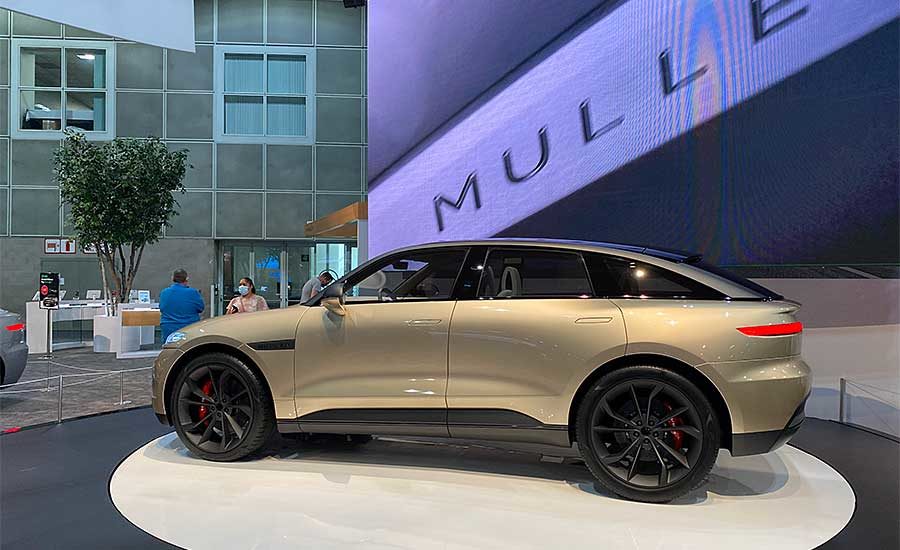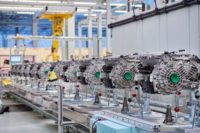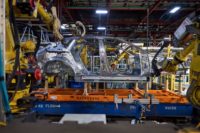Mullen Technologies Inc. is a start-up company that’s developing several types of electric vehicles, including a crossover, a sports car and a delivery van. The Brea, CA-based firm is led by an entrepreneur who formerly worked in the entertainment industry as a record producer.
Mullen’s flagship product, dubbed the Five, was recently unveiled at the Los Angeles International Auto Show. The luxury vehicle is due to go into production late next year, with first deliveries scheduled for early 2024.
The Five will be built on a skateboard platform that offers multiple trim levels. It will feature a dual-motor configuration that allows all-wheel drive and a top speed electronically limited to 155 mph.
With one full charge, the Mullen Five will have a range of 325 miles. The much-anticipated EV be able to accelerate from 0 to 60 mph in just 3.2 seconds, which will put it in the same league as the Tesla Model S Plaid.
The automaker is currently ramping up production of a cargo van called the Mullen One. It also plans to produce a two-seat model, dubbed the DragonFly, which will feature an all-aluminum body frame and carbon-fiber composite body panels. The sports car will be based on the Qiantu K50, an existing vehicle that's been on sale for several years in China. Future Mullen vehicles will include a seven-seat SUV.
One thing that sets Mullen apart from competitors is its battery technology. Unlike other companies that rely on lithium-ion batteries, Mullen is using a 95-kilowatt-hour lithium-sulfur battery pack that will enable it to achieve a goal of less than $90 per kilowatt hour.
Mullen and its supplier, NexTech Batteries Inc., claim that lithium-sulfur pouch format batteries are 60 percent lighter than lithium-ion. That improves vehicle efficiency and reduces overall energy consumption. It also results in 50 percent lower manufacturing costs.
Although its vehicles are designed in southern California, Mullen’s assembly plant will be located in a different part of the United States. The automaker recently opened an advanced engineering and manufacturing center in Tunica, MS. The 124,000-square-foot facility sits on a 100-acre site that includes a test track.
However, most Mullen vehicles will be assembled at a state-of-the-art factory located 50 miles north in Memphis, TN. The 820,000-square-foot facility is currently being retrofitted with robots and other equipment needed to support large-scale EV production. With the help of local and state incentives from the city of Memphis and the state of Tennessee, Mullen plans to create up to 800 jobs and deliver 100,000 vehicles over a five-year period, commencing in the fourth quarter of 2023.
Autonomous & Electric Mobility recently caught up with David Michery, CEO of Mullen Technologies, to learn more about the company’s ambitious plans.
AEM: What makes your EV design unique?
Michery: The Mullen Five will be the sexiest EV on the market with the most aggressive performance stats. It will be able to accelerate from 0 to 60 mph quickly, while also affording the ability to have long range. The Five will be built on a skateboard platform that offers multiple power train configurations and trim levels in a svelte design. Unlike other EVs, it will use lithium-sulfur batteries.
Lithium-sulfur batteries offer significant weight and cost advantages over lithium-ion. Our high-voltage battery packs are projected to be 60 percent lighter, promise to improve vehicle efficiency and increase range significantly. These more efficient, energy dense and safer batteries will catapult our EV vehicle lineup ahead of any competitor. That’s because sulfur is readily available, more sustainable, safer and a lot less expensive than cobalt and manganese. It is also an extremely safe chemistry; the pouch design is not subject to thermal runway reactions.
AEM: What is your production philosophy?
Michery: Our vehicles will be 100 percent made in America. Our pilot facility in Monrovia, CA, has been relocated to Tunica, MS, which is close to Memphis. Ultimately, this will produce significant savings in time and money. All of our initial vehicles and prototypes will be built in Tunica, which is equipped for low-volume production of up to 10,000 vehicles a year.
Tunica will allow us to perfect the engineering and manufacturing processes involved in building our EVs, while affording us the ability to assemble vehicles now. This facility is ideal for [our] upcoming initiatives and will be pivotal in allowing us to [produce] our vehicles faster than is typical in the auto industry.
Our main factory will be at a facility we’re leasing in Memphis, located across the street from FedEx’s world headquarters. It will contain a full-blown body shop, an automated paint shop and a general assembly line with a capacity to produce up to 75,000 vehicles a year. Memphis’ location makes it a primary logistical hub for distribution throughout the U.S. and will provide [us] with key strategic advantages. The Memphis factory provides us with the necessary manufacturing footprint to take Mullen to the next level, while also helping us create an economic powerhouse in the region.
AEM: How automated will your factory be?
Michery: We’re working with suppliers such as ABB Robotics, Comau and Dürr to create the most advanced, green facility the world has ever seen. The plant renovations will include a full revamp of an automated skillet line with an overhead hanger section, allowing [assemblers] to work flawlessly as [vehicles move] down the line. There is ample room to produce and scale up to meet demand, and there have also been areas created for offline subassemblies, quality checks and road testing. The [property] allows for future additions to be added to keep up with growing customer demand for electric vehicles.
AEM: Are you planning to build any EV components in-house?
Michery: No. We will be working with suppliers to purchase proprietary motors, controllers and other components. NexTech will supply the batteries, while Hofer Powertrain GmbH will develop and produce electric drive systems. However, we will be assembling battery packs in-house at the Memphis plant.
AEM: Will your vehicles feature any lightweight materials?
Michery: We’ll be using a wide array of lightweight materials, including aluminum, carbon-fiber composites and high-strength steel. The roof of the Five will be all-glass. Front and rear fascias will be made from thermoplastic materials. We also plan to use recycled plastics as reinforcements behind interior components. However, we’ll be using a traditional spot-welded stamped steel body to keep costs down.








